Intro
Discover preventive care explained, a holistic approach to healthcare emphasizing routine check-ups, screenings, and disease prevention strategies to promote overall wellness and reduce health risks through proactive medical interventions.
Preventive care is a crucial aspect of healthcare that focuses on preventing illnesses and injuries before they occur. It involves a range of activities, from routine check-ups and screenings to lifestyle modifications and vaccinations. By prioritizing preventive care, individuals can significantly reduce their risk of developing chronic diseases, improve their overall health and well-being, and enhance their quality of life. In this article, we will delve into the world of preventive care, exploring its importance, benefits, and key components.
The importance of preventive care cannot be overstated. Chronic diseases, such as heart disease, diabetes, and cancer, are among the leading causes of death and disability worldwide. These conditions are often preventable, and preventive care plays a vital role in reducing their incidence. By identifying risk factors and taking steps to mitigate them, individuals can lower their chances of developing these diseases. Furthermore, preventive care can help detect health problems early, when they are more treatable and less likely to cause long-term damage.
Preventive care is not just about avoiding illnesses; it is also about promoting overall health and well-being. Regular exercise, a balanced diet, and stress management are all essential components of preventive care. By incorporating these habits into daily life, individuals can boost their energy levels, improve their mental health, and enhance their physical function. Moreover, preventive care can help individuals maintain a healthy weight, reduce their risk of injuries, and improve their sleep quality. With the numerous benefits of preventive care, it is essential to understand its key components and how to incorporate them into daily life.
Types of Preventive Care
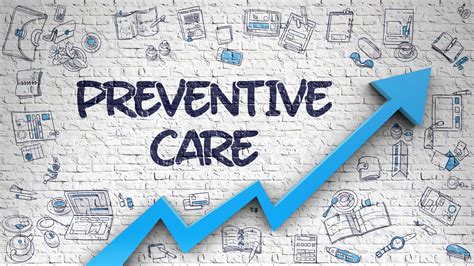
Preventive care encompasses a broad range of activities, including routine check-ups, screenings, and vaccinations. Routine check-ups are essential for monitoring health status, identifying potential health problems, and preventing illnesses. Screenings, such as mammograms and colonoscopies, can help detect diseases early, when they are more treatable. Vaccinations, such as flu shots and HPV vaccines, can prevent infectious diseases and protect against serious health complications.
Primary Prevention
Primary prevention involves taking steps to prevent health problems before they occur. This can include lifestyle modifications, such as quitting smoking, reducing alcohol consumption, and engaging in regular exercise. Primary prevention can also involve vaccinations, screenings, and other interventions aimed at preventing specific health problems.Secondary Prevention
Secondary prevention involves detecting health problems early, when they are more treatable. This can include screenings, such as blood pressure checks and cholesterol tests, as well as diagnostic tests, such as mammograms and colonoscopies. Secondary prevention can help identify health problems early, reducing the risk of long-term damage and improving treatment outcomes.Tertiary Prevention
Tertiary prevention involves managing health problems that have already occurred. This can include treatments, such as medication and surgery, as well as lifestyle modifications, such as dietary changes and stress management. Tertiary prevention can help reduce the impact of health problems, improve quality of life, and enhance overall health and well-being.Benefits of Preventive Care
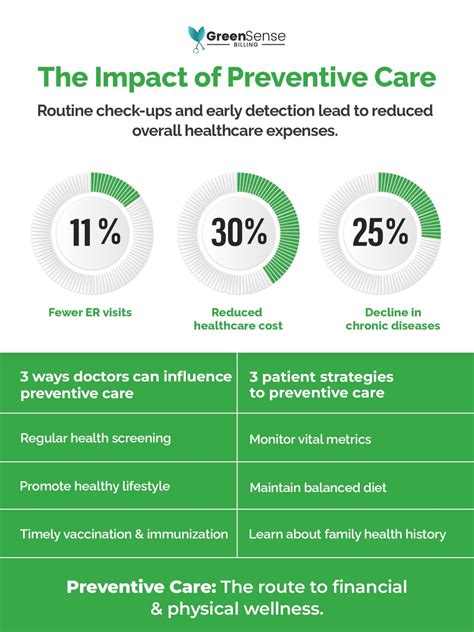
The benefits of preventive care are numerous and well-documented. By prioritizing preventive care, individuals can reduce their risk of developing chronic diseases, improve their overall health and well-being, and enhance their quality of life. Preventive care can also help detect health problems early, reducing the risk of long-term damage and improving treatment outcomes.
Some of the key benefits of preventive care include:
- Reduced risk of chronic diseases, such as heart disease, diabetes, and cancer
- Improved overall health and well-being
- Enhanced quality of life
- Early detection of health problems, reducing the risk of long-term damage
- Improved treatment outcomes
- Reduced healthcare costs
Reducing Healthcare Costs
Preventive care can help reduce healthcare costs by reducing the need for costly treatments and interventions. By detecting health problems early, individuals can avoid expensive hospitalizations, surgeries, and medications. Moreover, preventive care can help reduce the risk of chronic diseases, which are often costly to treat and manage.Improving Quality of Life
Preventive care can help improve quality of life by reducing the impact of health problems and enhancing overall health and well-being. By prioritizing preventive care, individuals can maintain their physical function, reduce their risk of injuries, and improve their mental health. Moreover, preventive care can help individuals maintain a healthy weight, reduce their risk of sleep disorders, and improve their overall sense of well-being.Key Components of Preventive Care
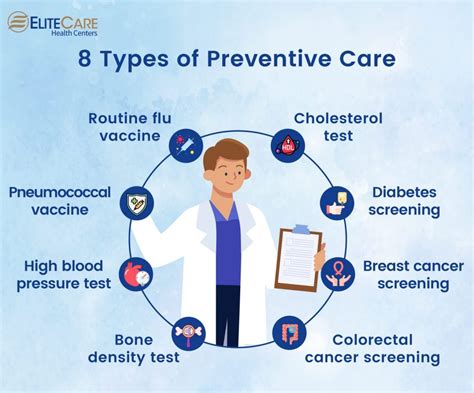
Preventive care involves a range of activities, from routine check-ups and screenings to lifestyle modifications and vaccinations. Some of the key components of preventive care include:
- Routine check-ups and screenings
- Lifestyle modifications, such as regular exercise and a balanced diet
- Vaccinations, such as flu shots and HPV vaccines
- Stress management and mental health support
- Sleep hygiene and sleep disorder prevention
Routine Check-Ups and Screenings
Routine check-ups and screenings are essential for monitoring health status, identifying potential health problems, and preventing illnesses. These check-ups can help detect health problems early, reducing the risk of long-term damage and improving treatment outcomes.Lifestyle Modifications
Lifestyle modifications, such as regular exercise and a balanced diet, are critical for maintaining overall health and well-being. These modifications can help reduce the risk of chronic diseases, improve physical function, and enhance mental health.Vaccinations
Vaccinations, such as flu shots and HPV vaccines, can prevent infectious diseases and protect against serious health complications. These vaccinations can help reduce the risk of illnesses, improve treatment outcomes, and enhance overall health and well-being.Implementing Preventive Care
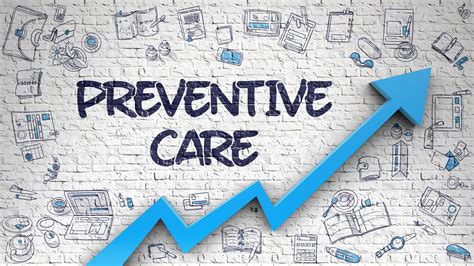
Implementing preventive care involves taking a proactive approach to health and well-being. This can include scheduling routine check-ups and screenings, engaging in lifestyle modifications, and staying up-to-date on recommended vaccinations. By prioritizing preventive care, individuals can reduce their risk of chronic diseases, improve their overall health and well-being, and enhance their quality of life.
Some of the key steps for implementing preventive care include:
- Scheduling routine check-ups and screenings
- Engaging in lifestyle modifications, such as regular exercise and a balanced diet
- Staying up-to-date on recommended vaccinations
- Practicing stress management and mental health support
- Prioritizing sleep hygiene and sleep disorder prevention
Scheduling Routine Check-Ups and Screenings
Scheduling routine check-ups and screenings is essential for monitoring health status, identifying potential health problems, and preventing illnesses. These check-ups can help detect health problems early, reducing the risk of long-term damage and improving treatment outcomes.Engaging in Lifestyle Modifications
Engaging in lifestyle modifications, such as regular exercise and a balanced diet, is critical for maintaining overall health and well-being. These modifications can help reduce the risk of chronic diseases, improve physical function, and enhance mental health.Common Preventive Care Services
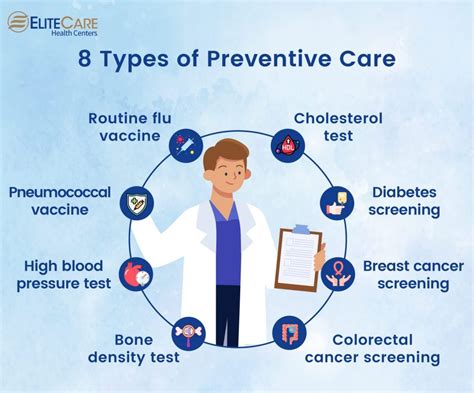
Preventive care services can vary depending on age, sex, and health status. Some common preventive care services include:
- Routine check-ups and screenings
- Vaccinations, such as flu shots and HPV vaccines
- Screenings, such as mammograms and colonoscopies
- Lifestyle modifications, such as regular exercise and a balanced diet
- Stress management and mental health support
Routine Check-Ups and Screenings
Routine check-ups and screenings are essential for monitoring health status, identifying potential health problems, and preventing illnesses. These check-ups can help detect health problems early, reducing the risk of long-term damage and improving treatment outcomes.Vaccinations
Vaccinations, such as flu shots and HPV vaccines, can prevent infectious diseases and protect against serious health complications. These vaccinations can help reduce the risk of illnesses, improve treatment outcomes, and enhance overall health and well-being.Preventive Care for Specific Populations

Preventive care can vary depending on age, sex, and health status. Certain populations, such as children, pregnant women, and older adults, may require specialized preventive care services.
Some of the key preventive care services for specific populations include:
- Childhood vaccinations and screenings
- Prenatal care and pregnancy screenings
- Breast cancer screenings and mammograms
- Colon cancer screenings and colonoscopies
- Flu shots and pneumonia vaccinations for older adults
Childhood Vaccinations and Screenings
Childhood vaccinations and screenings are essential for preventing infectious diseases and promoting overall health and well-being. These vaccinations and screenings can help reduce the risk of illnesses, improve treatment outcomes, and enhance overall health and well-being.Prenatal Care and Pregnancy Screenings
Prenatal care and pregnancy screenings are critical for promoting healthy pregnancy outcomes and preventing birth defects. These screenings can help detect health problems early, reducing the risk of long-term damage and improving treatment outcomes.What is preventive care?
+Preventive care is a range of activities aimed at preventing illnesses and injuries before they occur. It includes routine check-ups, screenings, vaccinations, and lifestyle modifications.
Why is preventive care important?
+Preventive care is essential for reducing the risk of chronic diseases, improving overall health and well-being, and enhancing quality of life. It can also help detect health problems early, reducing the risk of long-term damage and improving treatment outcomes.
What are some common preventive care services?
+Common preventive care services include routine check-ups and screenings, vaccinations, lifestyle modifications, and stress management. These services can vary depending on age, sex, and health status.
How can I implement preventive care in my daily life?
+Implementing preventive care involves taking a proactive approach to health and well-being. This can include scheduling routine check-ups and screenings, engaging in lifestyle modifications, and staying up-to-date on recommended vaccinations.
What are some benefits of preventive care?
+The benefits of preventive care include reduced risk of chronic diseases, improved overall health and well-being, and enhanced quality of life. Preventive care can also help detect health problems early, reducing the risk of long-term damage and improving treatment outcomes.
In conclusion, preventive care is a vital aspect of healthcare that can significantly reduce the risk of chronic diseases, improve overall health and well-being, and enhance quality of life. By understanding the importance of preventive care, its benefits, and its key components, individuals can take a proactive approach to their health and well-being. We encourage readers to share their thoughts and experiences with preventive care, and to take action in prioritizing their health and well-being. By working together, we can promote a culture of preventive care and improve health outcomes for individuals and communities alike.
